A home workshop is more than just a workspace for seasoned DIY enthusiasts -- for a lot of Americans, a home workshop is a sanctuary for creativity, innovation, and self-sufficiency. Whether you are a seasoned DIYer or someone just starting out with new DIY projects, like carpentry, welding, painting, and such, having a dedicated space can significantly improve efficiency, safety, and organization.
When planning a home workshop, one crucial consideration is power availability. A well-equipped workspace would require energy to run essential tools like saws, sanders, drills, and even 3D printers. Relying solely on the home’s electrical grid might not always be convenient, especially if your workshop is in a garage, shed, or basement with limited outlets. This is where a solar-powered generator from Jackery can become an invaluable asset. These portable power stations provide a reliable and eco-friendly power solution for home workshops, helping DIYers make incredible projects right from the comfort of their homes.
Key Takeaways
- A dedicated home workshop improves efficiency, safety, and accessibility, which allows DIY enthusiasts to work on projects.
- You can choose different locations for home workshops, such as a garage, basement, tiny home, or outdoor shed.
- Proper storage solutions, dust collection systems, and fire safety measures help maintain an organized, hazard-free workspace.
- Try to invest in a reliable power source, just like Jackery Solar Generator, that ensures uninterrupted workflow.
Why is a Home Workshop a Must for DIY Enthusiasts?
For DIYers, a home workshop is a place where they can imagine, ideate, and create wonderful things. From enjoying woodworking to metal crafting, upcycling old furniture, or electronic repair, a dedicated space at home streamlines the overall process. Here are a few key reasons why you should consider setting up a home workshop:
- With a dedicated workspace in your home, you can jump to your DIY projects whenever you have the bandwidth without wasting time organizing materials repeatedly.
- When you have a designated area for all your home workshop essentials, like an air compressor, table saw, belt sander, workbench, bench vise, lights, and more, it minimizes clutter and keeps everything within reach.
- A home workshop enables you to handle repairs, build furniture, and customize projects without the added expense of professional labor
- Unlike makeshift workstations, a properly set-up home workshop offers enhanced safety measures. Since you own the place and have built a home workshop, keeping you and your family members in mind, you will prioritize every little thing.
Choosing the Right Location for Home Workshop
When you start building your home workshop for DIY projects, you will need to understand the importance of selecting the ideal location. An ideal location will directly impact your home workshop's functionality, safety, and efficiency. Simultaneously, the available space, ventilation, lighting, and power supply will also ensure that you have everything you need in your workshop for your projects.
Here are a few of the most optimal locations for setting up a home workshop:
Garage Home Workshop
A home garage is one of the most popular choices for setting up a workshop. The garage home workshop provides easy accessibility and even offers the space needed for large projects, easy tool storage, and proper ventilation. If noise levels might be a concern for your home garage workshop, you may need to allocate space efficiently to accommodate both vehicles and workstations.
Tiny Home Workshop
If you are living in a compact space, an off-grid tiny house workshop can also be an innovative solution. In your time at home living, you can have wall-mounted storage, foldable workbenches, and multipurpose tools that can help you maximize limited space. Even though a tiny home workshop requires careful organization, it can be just as efficient as a large setup.
Tip: In order to have a well-planned tiny home workshop, you can have a Jackery Solar Generator that can power your tiny home appliances as well as your workshop tools.
Basement vs. Outdoor Sheds
A basement offers protection from external weather conditions and other factors, like noise, permits, and more. It also makes a great choice for year-round DIY projects. With a portable power station like Jackery’s, you don’t even have to worry about harmful fumes that might affect you and your family. However, ventilation and moisture control are considered to prevent damage to workshop tools.

On the other hand, outdoor sheds may provide a separate, dedicated workshop but it will further require insulation and weatherproofing to maintain a stable working environment. In the United States, there are different permits that are required for workshops that are set in outdoor sheds:
- If your outdoor shed is under 100 square feet, then it may not need a permit. However, the setup must meet zoning codes implied by your county.
- All the outdoor sheds that are between 100 and 200 square feet will need a zoning permit from the municipality.
- If your shed for an outdoor workshop is over 200 square feet, then it may need a building permit.
Home Workshop Essentials: Must-Have Tools & Equipment
Setting up a home workshop requires a curated selection of essential tools and equipment that might be useful when working on your DIY projects. The right tool will allow you to handle a variety of projects with precision and ease. Here are a few handy home workshop essentials that you must have in your space.
- Power Tools: These are the power-hungry tools that are used for high-performance work. Some of the most common power tools are drills, circular saws, sanders, jigsaws, and more.
- Hand Tools: Hand tools are small tools that usually do not require any power source to operate and can be handled manually. Some of the hand tools are hammers, screwdrivers, measuring tapes, clamps, and more.
- Safety Gear & Equipment: These are among the most important home workshop essentials. A few must-have safety gear in your workshop are safety goggles, gloves, dust masks, fire extinguishers, and more.
- Power Supply Solution: Proper tool power supply requires a reliable power source. A Jackery Solar Generator can ensure that your home workshop has all the power it needs for your DIY projects.
- Storage & Organization: In your home workshop, you will require a dedicated space for storing and organizing your equipment. You can have tool chests, pegboards, and shelving sheds for the same.
Here is a more detailed checklist that will help you understand all the important home workshop essentials:

Smart Home Workshop Ideas for Different DIY Projects
A well-designed home workshop should be designed in a way that one can create different project types. It means that your home workshop has tools and workspaces that align with your DIY project needs. Whether your focus is woodworking, electronics, or metalworking, always ensure that when you design a workshop, it should cater to different DIY projects that fit your specific needs. Some of the smart home workshop ideas that you can implement are:
Woodworking-Focused Workshop
When designing a woodworking home workshop, you should consider how it will accommodate cutting, shaping, and assembling wooden materials with ease and precision. A spacious workbench, power saws, chisels, planers, and sanders are also essential.

Metalworking Workshop
Metalworking workshops require a sturdy and heat-resistant workspace that features adequate safety precautions. Make sure that when building your metalworking workshop, you have a dedicated area for welding, grinding, and cutting metal components. Some of the key essentials for a metalworking workshop are welding machines, metal cutters, angle grinders, and drill presses.

Electronic & Small Repairs Workshop
For DIYers who want to work on electronics, they need to create a workspace that accommodates circuit building or even fixing small household appliances. In your electronics home workshop, you can have a soldering station with an adjustable temperature setting, circuit testers, and magnifying lamps are essential tools for intricate work. Most DIYers even add anti-static mats and wrist straps that prevent damage to sensitive electronic components.

Multipurpose DIY Workshop
A multipurpose workshop is not limited to only one type of work; rather, it should be designed to easily adapt to accommodate various types of projects. You can always go ahead with modular workbenches that can be reconfigured as needed. In addition, you should always have ample storage for a diverse range of tools and materials.

For all these kinds of home workshops, you can always rely on a Jackery Solar Generator or a Jackery Portable Power Station that provides a flexible power supply, especially if you build a DIY off-grid tiny home workshop or garage workshop.
Jackery Solar Generators for Home Workshop
With over 5 million units sold, Jackery is the leading manufacturer of solar generators, portable power stations, and solar panels. When building a home workshop, you need to have a reliable power source that would power not only your workshop appliances but can also be used as an emergency power backup solution for outages or for off-grid activities.
For all this and more, you can find Jackery Solar Generator an ideal solution. Here are a few Jackery Solar Generators that you can add to your home workshop:
Jackery Solar Generator 5000 Plus
The Jackery Solar Generator 5000 Plus is an absolute beast of a solar-powered unit that offers a powerful, eco-friendly solution for your home workshop. From small power appliances to large equipment, like an angle grinder, drill, disc sander, jig saw, circular saw, and more -- the high-capacity battery of this Jackery Solar Generator 5000 Plus ensures that you do not run out of power when needed.
Appliance Working Hours:
- Air Conditioner (2500W): 1.61H
- 1 hp Air Compressor (2000W): 2.01H
- Chop/Cut Off Saw (1800W): 2.24H
- Band Saw (1200W): 3.36H
- Disc Sander (1000W): 4.03H

Customer Review
“This is a great product. I am very satisfied. The smartphone app is very useful for monitoring and setting values in the system.” -- Gary.
Jackery Solar Generator 2000 Plus
For those who are looking for fast solar charging, long-lasting reliability, fume-free, and cost-effective power solutions for their home workshop, they should consider checking out Jackery Solar Generator 2000 Plus. Its sturdy and compact design makes it ideal for carrying from your living room to your home garage workshop. The built-in wheels also help you carry it to outdoor locations when working on construction sites.
Appliance Working Hours:
- Circular Saw (1400W): 1.16H
- Air Conditioner (1300W): 1.25H
- Angle Grinder (900W): 1.81H
- 1/2 hp Airless Sprayer (750W): 2.17H
- Jig Saw (700W): 2.33H

Customer Review
“I like the fact that the panels are interchangeable with my smaller Jackerys. I also love the fact that it can be used as a battery backup.” -- Jamey Scroggins.
Cost to Build a Home Workshop
Building a home workshop requires a financial investment, and understanding the associated costs will definitely help you with budgeting and planning. The total cost to build a home workshop depends on factors such as workshop size, materials, tools, and additional features like power supply solutions. When planning, you need to consider some of the key cost factors, like the foundation, weatherproofing, roofing, electrical setup, essential tools, and safety measures.
While a basic home workshop may cost around $8,000, a high-end setup with premium materials and equipment can exceed $30,000. Here’s a rough estimation of the cost to build a home workshop:
|
Expense Category |
Estimated Cost (USD) |
|
Foundation (gravel, concrete, piers) |
$500 - $2,500 |
|
Weatherproof Walls & Insulation |
$1,000 - $4,000 |
|
Roofing (metal, shingles, polycarbonate) |
$800 - $3,000 |
|
Doors & Windows |
$500 - $2,000 |
|
Electrical Wiring & Power Supply |
$1,500 - $5,000 |
|
Workbenches & Storage |
$800 - $3,500 |
|
Essential Tools & Equipment |
$2,000 - $8,000 |
|
Safety Features (fire extinguisher, ventilation) |
$300 - $1,500 |
|
Solar Generator |
$3299 - $4,999 |
|
Total Estimated Cost |
$9,200 - $38,000 |
Note: The estimated cost breakdown here is based on general industry data and the average cost available online. These estimations can vary based on workshop size, customization, and materials costs in different parts of the United States.
How to Build a Home Workshop for DIY Projects
Building a home workshop requires careful planning, from selecting the right location to ensuring long-term durability. Once you have finalized the ideal location and acquired the desired essentials, you can check out the following step-by-step guide that will help you build a home workshop that is both efficient and sustainable:
Step 1: Selecting the Perfect Location
Always start with the right spot when finalizing the home workshop. You should always consider areas that have ample space, good ventilation, and protection from harsh weather conditions.
Step 2: Preparing a Sturdy Foundation
A strong foundation helps the DIYer know that the workspace is always stable and long-lasting. You can choose a gravel base, concrete slab, or even raised piers that provide different levels of durability and resistance.
Step 3: Constructing Weatherproof Walls
When building a home workshop, make sure that the walls are made using weather-resistant materials that won’t warp or rot over time. You can use treated plywood, composite panels, or even insulated metal sheets to increase the longevity of your space.

Step 4: Install a Leak-Proof Roof
Your home workshop must be capable of withstanding heavy rain, snow, or even extreme heat. Some of the popular choices should be to include corrugated metal, asphalt shingles, and polycarbonate panels.
Step 5: Finishing Touches for Long-Term Durability
Go ahead with sealants, protective coatings, and UV-resistant paints that would help you extend the lifespan of your workshop. Furthermore, doors and windows should always be chosen based on durability and ease of maintenance.
FAQs for Home Workshop
How much space do I need for a home workshop?
The space required depends on the type of projects you plan to undertake. A tiny home workshop can function in as little as 50-100 square feet, whereas a more comprehensive setup for woodworking or metalworking may require 200-500 square feet or more.
What are the essential tools for a beginner’s home workshop?
Beginners' home workshop tools can be hammers, screwdrivers, measuring tapes, and wrenches. Power tools such as drills, jigsaws, and sanders are also useful, but they require handling precision, which comes with experience.
Can I use solar power to run my home workshop?
Yes, solar power is a great way to run a home workshop, especially if you use energy-efficient tools. A Jackery Solar Generator can provide ideal energy for lighting and power tools, which makes it ideal for your workshop to be more sustainable and reduce electricity costs.
How do I set up a dust collection in my home workshop?
A dust collection system is crucial for safety and cleanliness. You can go ahead and place air filters and use sealed storage for materials to reduce dust buildups.
How much does it cost to set up a basic home workshop?
The cost varies based on location, size, and equipment needs. A simple home workshop with basic tools and storage can cost between $1,500 and $5,000. A more advanced setup with power tools, workbenches, and a solar generator can range from $9,000 to $38,000.
Conclusion
Creating a home workshop is an invaluable investment for DIY enthusiasts, which offers convenience, efficiency, and safety while fostering creativity. Whether you are repurposing an existing space or building a new one, careful planning ensures that your workshop meets your needs for years to come.
When you are building a home workshop for your DIY projects, you should always ensure that there are essential tools and a reliable power source. Jackery Solar Generator offers an excellent power solution that offers uninterrupted workflow even in remote setups.

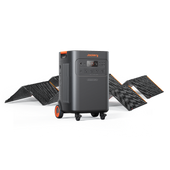



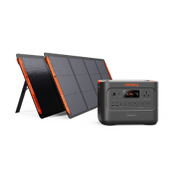












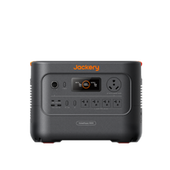










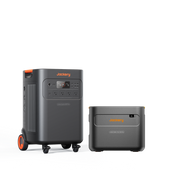
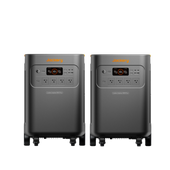
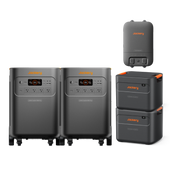





![[Add - on] Jackery Manual Transfer Switch for Explorer 5000 Plus - Jackery](http://www.jackery.com/cdn/shop/files/add-on-jackery-manual-transfer-switch-for-explorer-5000-plus-9017324.png?v=1754016782&width=170)
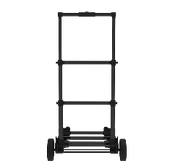
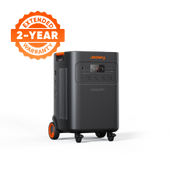
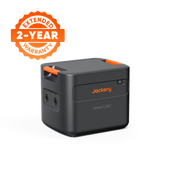


































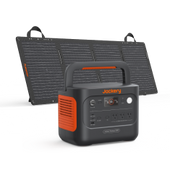
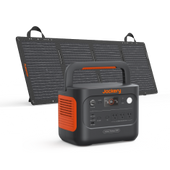


















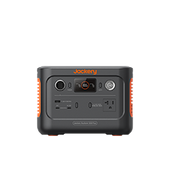


























Leave a comment